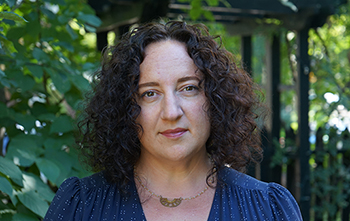
Rebecca Bartel

Office: AL-665 | Email: [email protected]
Rebecca C. Bartel is Associate Professor in the Department for the Study of Religion and Associate Director of the Center for Latin American Studies at San Diego State University. Bartel is a scholar of Religion, and her work takes an anthropological approach to tracing the entangled realms of religion, economy, and concepts of justice throughout the hemisphere. Her first book, "Card Carrying Christians: Debt and the Making of Free Market Spirituality" (University of California Press) is an ethnographic account of the relations between Christianity and capitalism in Colombia. This work details the debt upon which the Gospel of Prosperity rests and traces the Christian morality that underwrites financial capitalism. Rooted in two decades of professional and research experience in Colombia, Bartel considers how systems of belief and structures of capital evoke a financialized subjectivity. The book received an Honorable Mention for First Book Award from the Society for Latin American and Caribbean Anthropology.
Building on her work in Colombia, Bartel is currently working on 3 new projects. "Utterances of God in the Borderlands," considers the borderlands of faith, aspiration, and violence as they traverse the Americas from the Darién Gap to Tijuana, in both migrant experiences of en/closure and capture and the religious impulse that names the Border as god/ly.
The second project, "Rites and Rituals of Protection," examines the role that religion plays in creating and sustaining protective social and political infrastructures amid protracted violence. Bartel traces the sense-making and world-making practices of people who live in one of the most violent yet devout countries in the Americas (Colombia) by asking how individuals and communities develop diverse methods of protection through religious rubrics. Employing a deeply ethnographic method, this project explores the social, political, material, and affective “work” of discourses and practices of protection that sustain human survival, even flourishing, in profoundly precarious contexts. Bartel won a research grant from the American Academy of Religion to support this research and is in post-production with a documentary film on the same topic.
Finally, “Decolonizing Justice” is a community-based project that examines how groups of victims working with former perpetrators of violence in Colombia evaluate the impact of restorative justice in transitional contexts of post-conflict. Restorative justice initiatives serve as alternatives to traditional penal mechanisms and provide pathways towards social reintegration and reconciliation in territories where war has damaged social relationships and systems and has targeted racialized and colonized communities. This research investigates how and to what effect intercultural, decolonial, and non-Western conceptualizations of restoration and reconciliation are foundational to restorative justice. Central to this work is an exploration of the ways that concepts of "the sacred" inform community-based and decolonized formulations of "the just" and how putting these ideas into practice refracts concepts of reconciliation through pluri-cultural lenses.
Previous research has considered the political economy of Colombia’s armed conflict, the Christian morality that supports political processes of forgiveness, as well as the effects of Canadian mining on human rights discourse in Colombia. Professor Bartel’s research has been supported by the Social Sciences and Humanities Research Council (Canada), the Social Science Research Council, the American Academy of Religion, the Canadian Government’s Department of Foreign Affairs and International Trade, the Research and Solidarity Extension Fund of the National University of Colombia, and the W. Garfield Weston Foundation. Bartel is on the editorial board of the Journal of the American Academy of Religion, and co-chairs both the program unit on Religion and Economy and the Seminar on Publicly Engaged Scholarship at the American Academy of Religion.
Professor Bartel received her B.A. from the Canadian Mennonite University (Theology and Music), her M.A. from the Colombian university, Los Andes (Political Science) and her Ph.D. from the University of Toronto (Religion). She lectures on the anthropology of religion, anthropology of Christianity, religion and political economy, religion and film, method and theory in the study of religion, and Latin American and Latino/a religions.
"Revisited: Underestimating the force of the New Evangelicals in the public sphere." The Immanent Frame (May 6, 2024).
"The Revolution is Religious: Religion, Peace, and New Publics in Colombia." With Katerine Duque Duque. Journal of Religion & Society Supplement 25 (2024), 137-58.
"‘The University has a Political Responsibility’: Engaged Scholarship and Building Peace in Colombia." Journal for the Study of Religion, Nature and Culture (2024).
"Financializing the soul: Christian microfinance and economic missionization in Colombia." Critical Research on Religion, 9(1): 31-47.
"Classifying Capital: A Round Table." Co-edited with Lucia Hulsether. Journal of the American Academy of Religion 87(3):581-661.
"Bordering the Kingdom," in The Kingdom of God Has No Borders by Melani McAlister: A Book Forum. The Immanent Frame. August 16, 2018.
"Confession and the Anthropology of Forgiveness." Journal of Latin American and Caribbean Anthropology 24(1): 145-161.
"Giving is Believing: Credit and Christmas in Colombia." Journal of the American Academy of Religion 84(4):1006-1028.
"Underestimating the Force of the New Evangelicals in the Public Sphere." The Immanent Frame. November 15, 2016.
A virtual discussion at the Universidad Nacional Abierta y a Distancia UNAD on Cátedra Permanente con la Colombia Profunda: La creencia en las ánimas benditas del purgatorio.
An interview with NYUs, "The Revealer" on Credit Card Christianity, Debt, and Violence in Colombia.
An interview on the podcast, "This is Hell," - Do You Believe in Financial Resurrection? Faith and Debt in Neoliberal Colombia.